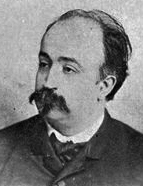

José Frederico Laranjo was born of humble background in Castelo de Vide, son of Possidónio Mateus Laranjo and Maria José Correxana. He began ecclesiastical studies, quickly abandoned, and then went instead to the Faculty of Law at Coimbra University, where he graduated and started an academic career. He taught various courses, distinguishing himself for his lecturing on Political Economy and Constitutional Law. However, his academic activity was interrupted by politics, spending many years as a deputy in the National Assembly for the Progressive Party, and later as a peer of the realm. He sat on various parliamentary commissions, particularly those relating to banking matters, but he never held a position in government. As a member of many scientific societies, both national and foreign, he made a lasting contribution to the press, as well as giving firm support to the promotion of cooperativism and popular education. He had a long-standing commitment to local and regional ways of life, and in the university he promoted the study of local history (cf. A. Ventura, José Frederico Laranjo (1846-1910), 1996, and J. C. Graça, As Ideias Económicas…, 2002).
In 1871 Laranjo intervened into the dispute on the principle of law that took place in Coimbra, between the academics Rodrigues de Brito and Vicente Ferrer Neto Paiva, defending Kant’s principle of neminem laedere, i.e. harm no one. He argued that it was possible, while maintaining Kant’s principle as the basis of law, to complete it with Brito’s system, of the so-called mutuality of services, which would constitute its content. Within this line of thought, which led from Kant to socialism, he referred favourably to Fichte and the so-called utopian socialists. Of Fourier’s system, he declares cautiously in his Latin thesis (These ex Universo Jure quas (…), 1877, p. 17) that he finds it defensible in all respects, except with regard to the family. That index finger of the law also points out the foreseeable future of mankind, since its history reveals a progressive approximation from what is towards what “should be”. Humanity fulfils its potential historically, cumulatively, following a trajectory that corresponds to true progress, as an expression of its defining characteristic: perfectibility. In this respect he subscribes to the thesis that history, departing from an initial whole, leads, by way of a subsequent phase of differentiation and conflict, to a third phase, with a new and more complex form of unity and coherence. He also subscribes to the notion that this process, at first unconscious, transforms itself into another, conscious one, in which subject and object become confused, and of which the philosophy of history is itself the epitome. He openly gathered these elements from the works of Saint-Simon, Hegel, and their respective disciples.
